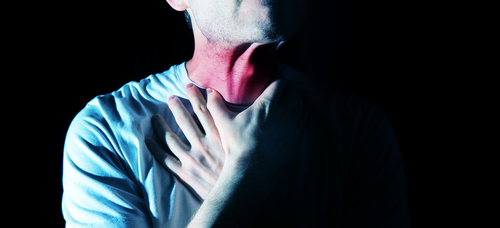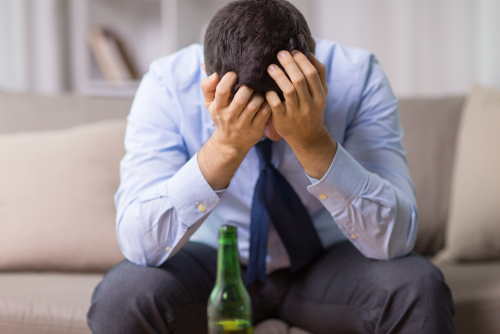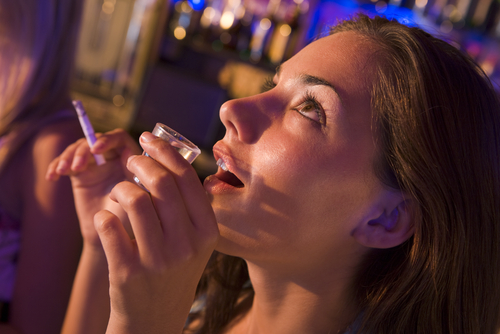If you want to know why you have a sore throat after drinking or if it’s a sign of alcohol abuse, this is the article for you. After a night of heavy drinking, you’ll probably start to feel the effects of a hangover, including a sore throat, stomach pain, and nausea. Hangovers can be tough on your body, and it’s important to recognize the long-term effects of alcohol on your organs and brain and how it can lead to an addiction.
This brief article discusses why drinking alcohol affects your throat, if it’s a sign of addiction, and other negative effects of alcohol.
If you feel your use of alcohol has gotten out of your control, help is available. East Coast Recovery offers alcohol addiction treatment programs on an outpatient basis. Reach out today to learn more.

Why Does Drinking Alcohol Cause A Sore Throat?
Drinking alcohol can cause a sore throat because it affects your body’s ability to retain water, weakens your immune system, strains your vocal cords, or leads to gastroesophageal reflux disease. Here’s why your throat is sore the day after drinking.
- Vomiting: If you’ve thrown up multiple times after drinking, it can lead to a sore throat. The stomach acid inside your vomit can irritate your throat and cause insatiable pain.
- Yelling over loud noises: When you’re drinking alcohol, it’s common to be in loud environments with lots of yelling, singing, and talking. This can strain your vocal cords and leave you with a hoarse voice and a sore throat the next day.
- Alcohol’s drying effect: Alcohol acts as a diuretic, making you urinate more frequently and dehydrate your body. This can dry out the protective mucus membranes in your throat, causing friction and leading to a sore throat.
- Weakened immune system: Alcohol weakens your immune system, making you more susceptible to bacterial, fungal, and viral infections. This can result in a sore throat as one of the symptoms.
- Gastroesophageal reflux disease (GERD): GERD is when stomach acid flows back up into the esophagus. If you have GERD, alcohol can worsen your symptoms and contribute to a sore throat.
- Sensitivity to sulfites: Some alcoholic beverages, like beer and wine, contain sulfites. If you’re sensitive to sulfites, it can trigger asthma symptoms or even a severe allergic reaction called anaphylaxis, which can include a sore throat.
- Grain allergy: An allergy to grains can also lead to asthma symptoms or anaphylaxis. Drinking grain alcohol can worsen these allergic reactions and result in a sore throat.
- Alcohol intolerance: Some people are intolerant to alcohol itself or its ingredients. This can cause symptoms like a runny nose or worsen pre-existing asthma conditions, leading to a sore throat as part of the body’s reaction to alcohol intolerance.
Read more: Do Alcoholics Get Hangovers? Why It’s More Intense
Is A Sore Throat A Sign Of Alcohol Addiction?
A sore throat after drinking isn’t necessarily a sign of addiction, but if you’re binge drinking and experiencing frequent hangover symptoms, chances it’s turning into one. When someone is addicted to alcohol, they often engage in frequent and excessive drinking, leading to more frequent and intense hangovers.
To avoid hangover symptoms, individuals with an alcohol use disorder may want to drink again when they wake or shortly after. This cycle of excessive drinking and subsequent hangovers can develop or worsen an alcohol addiction.
Take Our Addiction Quiz For Recovery Insights

Other Hangover Effects Of Alcohol
Sore throats aren’t the only side effect of hangover symptoms from alcohol consumption. These symptoms have various intensities and duration and include:
- Nausea and dizziness
- Headaches
- Sweating
- Fatigue
- Diarrhea and other stomach problems
- Difficulty concentrating
- Trouble controlling movements
- Anxiety
- Dehydration and dry mouth
- Loss of appetite
- Irritability
- Shivering, trembling, and an overall sense of discomfort and discontent.

How Drinking Alcohol Can Lead To Throat Cancer
Sore throats are not the only thing alcohol causes. According to the National Cancer Institute, alcohol and smoking are two leading causes of throat, mouth, and voice box cancer.
- Acetaldehyde: Drinking alcohol results in the breakdown of alcohol into a harmful chemical called acetaldehyde. This acetaldehyde can cause damage to your DNA and hinder the body’s ability to repair it. When DNA is compromised, cells may start growing uncontrollably, potentially leading to the development of cancerous tumors.
- Smoking and drinking: When you drink alcohol and smoke tobacco together, the risk of developing certain cancers increases significantly compared to drinking or smoking alone. This is because alcohol can assist in allowing harmful chemicals from tobacco to enter the cells that line the mouth, throat, and esophagus. Additionally, alcohol can hinder the cells’ ability to repair the DNA damage caused by these tobacco chemicals.
- Oxidative stress: Alcohol intake can cause your cells to experience oxidative stress, an imbalance of harmful molecules called reactive oxygen species. These reactive oxygen species can damage your cells and raise the risk of developing cancer.
- Irritation: Excessive alcohol consumption can irritate the throat and vocal cords, leading to a sore throat, hoarseness, or voice changes. It can cause inflammation and dryness, affecting vocal quality and making it difficult to speak clearly.
- Dehydration: Alcohol can dehydrate the mouth, reducing saliva production. This dryness can contribute to bad breath and increase the risk of oral health issues such as tooth decay and gum disease. Alcohol can also irritate the lining of the mouth, leading to discomfort or sores.
Read more: Why Go to Rehab for Alcoholism in Boston?

Contact East Coast Recovery Center
If you or a loved one is struggling with binge drinking, extreme hangover, or alcohol withdrawal symptoms, or want to know more about alcohol addiction treatment, contact East Coast Recovery Center. Our alcohol rehab program is the perfect opportunity to address alcohol use disorders, as well as the underlying contributing factors. If you’re still unsure about our center, call, and one of our admissions agents can guide you through our different programs and therapy options. The strength to stop drinking isn’t something you need to find alone, and our treatment staff is ready to help.
Connect With Us Now
Reach out to East Coast Recovery now for immediate support, or let us know the best time to contact you through our confidential callback service. Your journey to healing is just a conversation away.
Reviewed By A Specialist In The Field
Vernetta received her Master of Science degree in Clinical Mental Health Counseling at Western Carolina University, and she also holds a MA in History and a BA in Theatre Arts. She is trained in Acceptance and Commitment Therapy (ACT) and uses ACT to help clients decrease their suffering and move in the direction of their values. She is passionate about the effectiveness of Experiential Therapy, and has witnessed clients accessing their underlying issues with the aid of creative approaches. She believes in the power and influence of the group process and its ability to propel clients into committed action through the solace of connection. Vernetta is also a HeathRhythms drumming facilitator and enjoys empowering clients to express themselves through rhythm.
Dr. Brady J. Schroer is a psychiatrist in Asheville, North Carolina and is affiliated with Pardee UNC Health Care-Hendersonville. He received his medical degree from Kansas City University of Medicine and Biosciences College of Osteopathic Medicine and has been in practice for more than 20 years.












